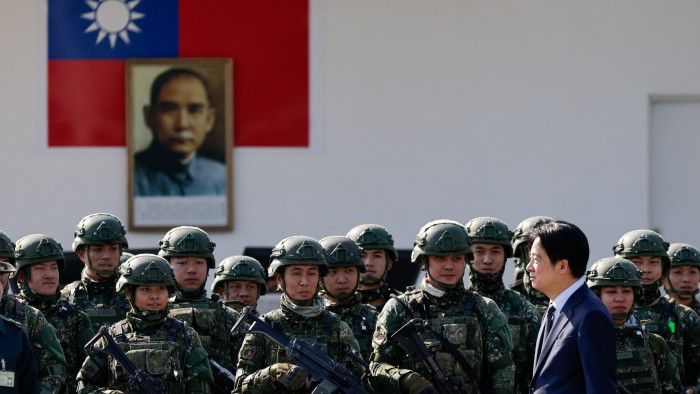Unlock the White House Watch newsletter for free
Your guide to what the 2024 US election means for Washington and the world
Taiwan’s parliament has frozen critical parts of the 2025 defence budget, heightening the risk that the country alienates US President Donald Trump just at the moment that it needs firm US support against security threats from China.
Taipei has been eager to demonstrate to the incoming US administration that it is stepping up efforts to strengthen its defences. Trump claimed in July that Taiwan “doesn’t give us anything” and compared the US to “an insurance company” for the island nation’s security.
But just hours after Trump was inaugurated to a second term on Monday, Taiwan’s opposition-controlled legislature voted to freeze half the country’s budget for its submarine programme, 30 per cent of the military’s operations expenditure and one-third of the funding for a drone industry park. It also cut 60 per cent of the defence ministry’s publicity budget.
Taiwanese government officials and ruling party lawmakers accused the Kuomintang, the largest opposition party, of helping China by undermining President Lai Ching-te’s minority government.
Blocking parts of the defence budget “shows the world that Taiwan’s determination to defend itself has been significantly compromised”, premier Cho Jung-tai told reporters.
Po Horng-huei, vice-minister of defence, said that the freeze on the operations budget would impede the military’s daily efforts to counter “grey zone” provocations from China, while the drone funding restrictions would set Taiwan further back in an area where it already “lags far behind” the People’s Liberation Army, and that has become a crucial weapons category since the war in Ukraine.
The slashing of the publicity budget would hinder efforts to fight Chinese cognitive warfare, he added.
“Our defence will move backwards this year,” Po said.
The draft budget submitted by Lai’s government in August included NT$647bn (US$20bn) in defence spending. While that was a 7.7 per cent increase over the 2024 budget, it amounts to only 2.45 per cent of GDP, down from 2.5 per cent last year and short of the 3 per cent target US officials and defence experts have urged for Taiwan.
Elbridge Colby, Trump’s nominee for under-secretary of defence for policy, has repeatedly criticised Taiwan over its “meagre” defence spending, and has suggested US support would be moot unless Taipei strengthened its defences against the threat from China.
Beijing claims Taiwan as part of its territory and threatens to annex it by force if Taipei refuses unification indefinitely. Over the past few years, it has stepped up military operations around Taiwan.
Counter to Trump’s claims, Taipei is one of the largest paying customers for US defence companies.
But Washington maintains a policy of “strategic ambiguity” on whether it would come to Taiwan’s defence. Under the Taiwan Relations Act, the US considers any effort to determine Taiwan’s future by non-peaceful means as of grave concern to the US, and commits to providing Taiwan with defensive weapons and to maintaining its own capacity to resist coercion that would jeopardise Taiwan’s security.
Former president Joe Biden said on multiple occasions that the US would deploy forces to defend Taiwan against a Chinese attack, but Trump has said it would be “very, very difficult” to do so.
Taiwan’s military will be able to access the frozen funds only if parliament agrees to unblock them following a report from the defence ministry at a plenary session.
Although the KMT advocates for closer ties across the Taiwan Strait, it denies being pro-Beijing and has previously pledged to support increased defence spending.
But opposition lawmakers attacked government spending plans as “wasteful”, echoing some voters’ criticism about the ruling party.
Read the full article here

